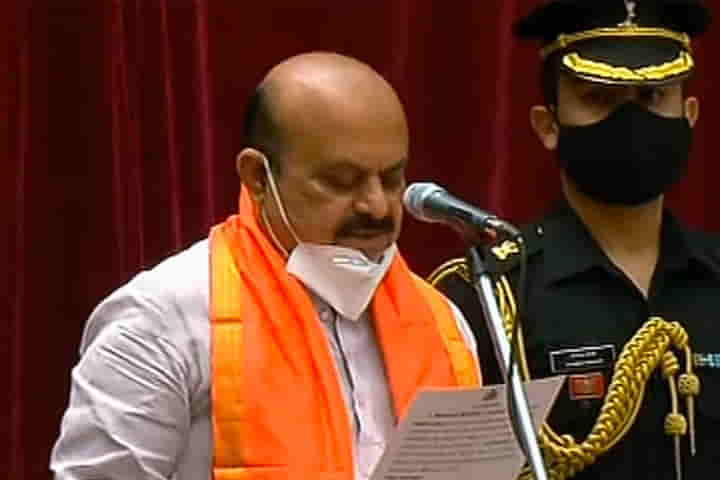

Karnataka Chief Minister Basavaraj Bommai
With the Election Commission of India’s announcement of polls to the Karnataka Assembly on May 10 and the counting of votes on May 13, the stage is set for a battle royale between the ruling Bharatiya Janata Party (BJP) and Congress, the two traditional rivals. The Janata Dal (Secular), being Karnataka’s own regional party for the last 24 years, as usual, is waiting in the wings to play a ‘spoiler’ or a ‘king maker’ as the situation demands.
As of today, the 224-member house appears headed for a hung Assembly with Congress slightly ahead of the BJP. But the situation is rapidly changing and Election Day could throw up a surprise.
In the last elections held in May 2018, the BJP secured 104 seats, the Congress 78 and the JD(S) 37. As BJP fell short of a majority by nine seats, Congress and JD(S) joined hands to form a coalition government with HD Kumaraswamy as chief minister. The experiment collapsed after 14 months as BJP veteran, BS Yediyurappa engineered defections from both his rivals and brought in a BJP government, which is now going to the polls under the chief ministership of Basavaraj Bommai.
Shrewd voters of Karnataka
Bommai, who is the son of former chief minister and Union minister, SR Bommai, has a special challenge on his hands as the ‘shrewd’ Karnataka voters have voted for a new government in succession over the last seven elections.
It was Ramakrishna Hegde, who headed the first non-Congress Janata Party government in 1983, who obtained a repeat mandate in 1985 when he opted for a mid-term election. So, Bommai will have to break a 38-year-old record to return to power.
With hopes soaring in the Congress camp with the ‘smell’ of a victory, there is intense fight for chief ministership between Siddaramaiah and DK Shivakumar. The 75-year-old Siddaramaiah, who became only the second chief minister in Karnataka’s history to enjoy a full five-year term after Devaraj Urs before his defeat in 2018, is eyeing another term. But, KPCC president and eight-time MLA Shivakumar, who is faced with money laundering charges, is no less determined to fulfil his ambition.
Siddaramaiah, being a mass leader, who is unsparing of his criticism of Prime Minister Narendra Modi, has the backing of both Sonia and Rahul Gandhi and he will surely get the nod for chief minister’s post should the Congress party attain majority on its own.
On the other hand, if it turns out to be a hung verdict with Congress ahead of the BJP in terms of numbers, and the JD(S) is called upon to play a role in government formation, Shivakumar will enjoy a definite edge over Siddaramaiah.
Siddaramaiah, who jumped from JD(S) to the Congress in 2006, is intensely hated by the Deve Gowda family. Kumaraswamy firmly believes that Siddaramaiah played a ‘dirty hand’ in the fall of his coalition government in 2019 by silently encouraging the defection of 15 Congress MLAs to the BJP.
Besides, Shivakumar being a Vokkaliga enjoys ‘blood relationship’ with JD(S) leaders and also, they believe, he will be eminently accommodative of the demands of JD(S) during the government formation. Already, there is a strong speculation that Shivakumar has promised Kumaraswamy’s son, Nikhil Kumaraswamy’s ‘easy passage’ to the Assembly. Nikhil is tipped to make his debut in the Assembly from Ramanagara constituency.
But, all these ‘rosy plans’ of the Congress and the JD(S) could go up in smoke if the BJP is able to put up a strong performance and inch closer to the majority mark or attain majority on its own. Prime minister Modi and Union home minister Amit Shah have made repeated visits to Karnataka over the last three months galvanising public support for a ‘double engine’ government.
Funds and projects
Over the last two years, the Centre has flooded Karnataka with funds and projects worth several thousands of crores and Modi himself has inaugurated many of them to demonstrate the Centre’s commitment to the state.
As compared to 2018, one crucial factor which could play a silent but significant role in ensuring support for the BJP is the implementation of the PMO-administered schemes which directly benefit the people.
Under the prime minister’s Jan Suraksha Yojana, 1.4 crore people in the state are getting Rs 6,000 per annum in their bank accounts, under the Ayushman Bharat health scheme, all BPL card holders have been getting benefits worth Rs 5 lakh and under the prime minister’s Jan Awas Yojana, 30 lakh beneficiaries have been sanctioned Rs 10 lakh each for construction of houses.
The BJP reckons that these and other schemes reaching the people directly, irrespective of their castes or religions, could influence the voters to “vote for Modi” in the Assembly elections, just as they have done in the recent Parliament elections.
Australia's High Commissioner to India, Philip Green OAM, called Yoga one of India's gifts to…
The Bharat Sanchar Nigam Limited (BSNL) has announced the soft launch of BSNL Quantum 5G…
The Indian Embassy in Iran has said that the embassy will make efforts to evacuate…
India's gross direct tax collections for the financial year 2025-26 rose by 4.86 per cent…
Russian President Vladimir Putin has said that Moscow is not seeking Ukraine's unconditional surrender, but…
Extending his greetings on the 11th International Day of Yoga, Lok Sabha speaker Om Birla…